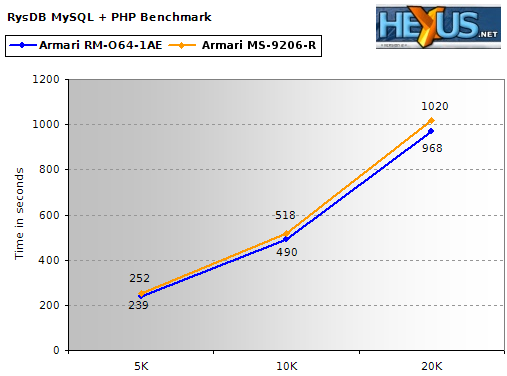RysDB Webserver Benchmark
We turn the fat database into a dynamic page webserver by putting Apache and mod_php4 on top. My unedited ss2log code is the engine for this benchmark and we do become slightly disk limited here, as the PHP module goes nuts opening repeat connections to the database.Overall however, we should still be CPU and system limited (memory controller performance should play a part).

The graphs plots time to complete the number of requests over 3 different levels, 5,000 pages, 10,000 pages and 20,000 pages. It's wholly unoptimised, with no persistent database connection and the script not asking for any duplicate data. This means as a true webserver benchmark, say if you wanted to see performance of a server for a tech website where 90% of your traffic is to the latest article you have published, it's inaccurate. Instead I made it as hard as possible for each computer.
The good news is that performance pretty much scales linearly as you can see. With no duplicate data being asked for, the software cannot cache it on the processor for rapid access. So time to execute goes up in a nice ~45° slope.
The Opteron system executes the benchmark roughly 5% faster than the Intel system at each step of the test. I was expecting the same 10% difference as before, but both systems make light work of this test. With nearly full Ethernet link saturation, both systems have performance left over on a completely optimised base with a better disk subsystem and optimised network setup.
Low latency memory performance and lots of bandwidth seems to be key here, along with as much CPU horsepower as possible. While traditional webserver benchmarks usually show that disk performance is the main limiting factor, that's not the case in this particular test, vindicating its use in showing off both systems.
On to the low level 32-bit tests.









